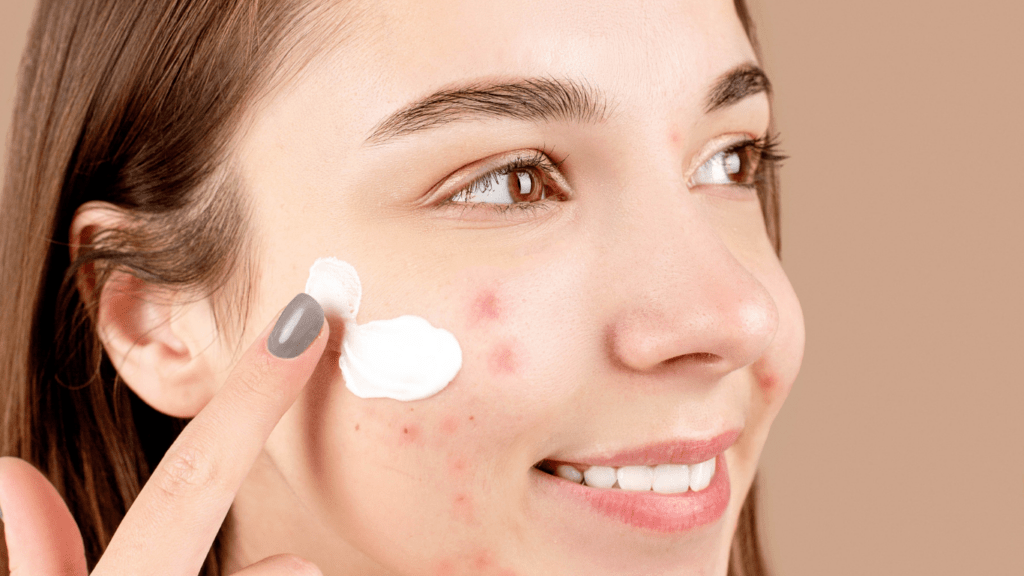Understanding Holistic Approaches
Holistic health looks at the whole person, not just isolated symptoms. It involves integrating physical, mental, and emotional well-being to address issues like acne effectively.
What Is Holistic Health?
Holistic health focuses on treating the entire individual. It factors in physical, mental, emotional, and sometimes spiritual aspects of well-being. It doesn’t just aim to relieve symptoms but addresses the underlying causes of health issues. For instance, stress reduction and healthy diet changes are part of holistic health practices. It’s more comprehensive as it considers how various aspects of one’s life interconnect.
Key Principles of Holistic Skincare
Holistic skincare emphasizes nourishing the skin from the inside out. The primary principles include:
- Healthy Diet: Eating a balanced diet rich in fruits, vegetables, lean proteins, and whole grains. Foods like fish, nuts, and leafy greens promote skin health by providing essential nutrients.
- Hydration: Drinking enough water daily. Hydration helps maintain skin’s elasticity and freshness. Aim for at least 8 cups of water daily.
- Stress Management: Practicing stress-reducing activities like yoga and meditation. Chronic stress can trigger hormonal imbalances that lead to acne.
- Adequate Sleep: Ensuring 7-9 hours of quality sleep nightly. Sleep is crucial for skin repair and regeneration.
- Natural Skincare Products: Using products free from harsh chemicals. Ingredients like aloe vera, tea tree oil, and honey are gentler on the skin.
- Regular Exercise: Engaging in physical activities that boost circulation and detoxification. Exercise helps manage stress, enhancing overall skin health.
Holistic skincare connects internal well-being with external skin health, ensuring a balanced approach to acne reduction.
Dietary Changes for Clear Skin
Incorporating specific dietary changes can significantly impact skin health and reduce acne. A balanced diet helps manage internal triggers of acne, contributing to clearer skin.
Foods to Avoid
Eliminating certain foods from your diet can reduce acne flare-ups for some people.
- Sugary Foods: High sugar intake spikes blood sugar levels, increasing insulin production and causing inflammation. Avoid candies, sodas, and sugary cereals.
- Dairy Products: Dairy can trigger hormonal imbalances that may lead to acne. Limit milk, cheese, and ice cream consumption.
- Processed Foods: Processed foods often contain unhealthy fats and preservatives that can worsen acne. Avoid fast food, packaged snacks, and frozen meals.
Nutrient-Rich Foods to Include
Adding nutrient-dense foods to your diet supports skin health and reduces acne.
- Omega-3 Fatty Acids: Omega-3s reduce inflammation and improve skin health. Include salmon, walnuts, and flaxseeds.
- Antioxidant-Rich Foods: Antioxidants protect your skin from damage. Eat berries, spinach, and dark chocolate.
- Probiotics: Probiotics balance gut health, which can improve skin clarity. Incorporate yogurt, kefir, and sauerkraut.
Hydration’s Role in Acne Prevention
Proper hydration is crucial for maintaining clear skin. Dehydration can lead to dry skin, triggering excess oil production and acne.
- Water Intake: Drink at least 8 cups (64 ounces) of water daily to keep the skin hydrated.
- Herbal Teas: Herbal teas like green tea have anti-inflammatory properties that benefit skin health.
Incorporating these dietary changes can play a vital role in reducing acne, complementing other holistic approaches to skin care.
Stress Management Techniques
Stress management plays a vital role in holistic acne reduction. High stress levels can lead to increased oil production and inflammation, worsening acne symptoms.
Mindfulness and Meditation

Mindfulness and meditation offer powerful methods to reduce stress. Engaging in daily mindfulness practices helps me stay present, lowering stress levels. Techniques like deep breathing, body scanning, and guided meditation sessions can significantly reduce cortisol levels. According to a 2020 study in the Journal of Clinical Psychology, participants practicing mindfulness exhibited lower stress indicators.
Physical Activities
Physical activities are excellent for stress relief. Regular exercise releases endorphins, which improve mood and decrease stress. Activities like yoga, walking, running, and dancing help relax my body and mind. A 2018 Harvard Medical School report indicated that moderate aerobic exercise reduces stress hormones while stimulating endorphin production.
Adequate Sleep
Adequate sleep is crucial for stress management and skin health. Aim for 7-9 hours of quality sleep each night. Poor sleep increases stress levels, leading to hormonal imbalances that can exacerbate acne. Data from the National Sleep Foundation highlights that consistent sleep schedules improve not only stress levels but also skin condition.
Together, these stress management techniques complement holistic approaches to reducing acne. By integrating mindfulness, regular physical activity, and sufficient sleep into my daily routine, I promote overall wellness and clearer skin.
Natural Topical Treatments
Natural topical treatments offer effective ways to address acne directly on the skin while aligning with a holistic approach. They minimize exposure to harsh chemicals and focus on using nature’s ingredients.
Essential Oils
Essential oils provide potent, natural solutions for acne. Tea tree oil, known for its antibacterial properties, helps reduce inflammation and kill acne-causing bacteria. Lavender oil soothes irritated skin while reducing redness. Apply essential oils diluted with a carrier oil like jojoba or almond oil to avoid skin irritation. Noteworthy mentions include tea tree, lavender, and rosemary oils, which show promising results for many users.
Herbal Remedies
Herbal remedies leverage the therapeutic benefits of plant-based ingredients. Aloe vera, with its anti-inflammatory and healing properties, makes an excellent acne treatment. Calendula, known for its antibacterial and antiseptic qualities, speeds up the healing process. Green tea extract, loaded with antioxidants, reduces sebum production and inflammation. Use concentrated extracts or gels derived from these herbs directly on the affected areas to harness their full benefits.
DIY Masks and Scrubs
DIY masks and scrubs made with natural ingredients help exfoliate and nourish the skin. A honey and cinnamon mask combines honey’s antibacterial properties and cinnamon’s anti-inflammatory effects to fight acne. An oatmeal scrub gently exfoliates dead skin cells while soothing irritation. Ingredients like honey, cinnamon, and oatmeal are accessible and effective, making them ideal for homemade treatments.
By integrating these natural topical treatments, I can effectively complement internal wellness practices, addressing acne comprehensively from the inside out.
The Importance of Gut Health
Gut health plays a pivotal role in managing acne. An imbalanced gut can lead to inflammation, affecting skin health and exacerbating acne.
Probiotics and Prebiotics
Probiotics are live beneficial bacteria that enhance gut health. Examples include yogurt, kefir, sauerkraut, and kimchi. Probiotics improve digestive health by balancing gut microbiota, reducing inflammation, and supporting immune function.
Prebiotics are non-digestible fibers that feed these beneficial bacteria. Examples include garlic, onions, bananas, and asparagus. Prebiotics foster a healthy gut environment, which indirectly benefits skin health.
Gut-Friendly Foods
Certain foods promote gut health. Fermented foods like miso, tempeh, and kombucha introduce beneficial bacteria to the gut. High-fiber foods such as whole grains, legumes, fruits, and vegetables enhance gut health by promoting regular bowel movements, flushing out toxins, and supporting overall digestion.
The Gut-Skin Connection
There is a significant connection between gut health and skin health. An unhealthy gut can lead to systemic inflammation, which manifests as acne. Research shows that people with acne often have lower levels of beneficial gut bacteria compared to those without acne.
By maintaining a balanced gut microbiome, the body can reduce inflammation, improve nutrient absorption, and promote clearer skin. This underscores the importance of gut health in a holistic acne reduction strategy.
Lifestyle Adjustments
Incorporating specific lifestyle changes can significantly impact your skin’s health.
Hygienic Practices
Maintaining proper hygiene helps reduce acne. I always clean my face twice daily with a gentle cleanser to remove dirt and oil buildup. Using clean towels and pillowcases is crucial; they can harbor bacteria that worsen acne. I also avoid touching my face with unwashed hands to prevent the transfer of dirt and bacteria.
Avoiding Environmental Toxins
Limiting exposure to environmental toxins is essential. I’m mindful of avoiding smoking and secondhand smoke, as they can clog pores and cause inflammation. I also aim to reduce exposure to polluted air by using air purifiers indoors and wearing a protective face mask when necessary. Choosing natural, non-toxic household products can minimize skin irritation and breakouts.
Consistent Skincare Routine
A consistent skincare routine tailored to my skin type helps manage acne. I use non-comedogenic (non-pore-clogging) products to prevent blockages. Incorporating treatments like salicylic acid or benzoyl peroxide, under guidance, can target acne effectively. I apply moisturizer to keep my skin hydrated and sunscreen daily to protect against UV damage.



